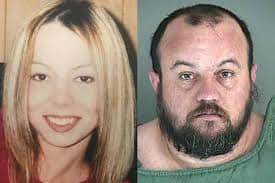by George Jared
More than 18 years after 22-year-old Rebekah Christian Gould was murdered in a home near Guion, a man will be imprisoned for at least 30 years in connection with her grizzly death. William Alma Miller, 46, clad in an inmate jumpsuit on Tuesday (Oct. 18) admitted that he struck Gould in the head twice with a piano leg and then strangled the woman to death with a necktie inside the home of his first cousin, Casey McCullough, on or about Sept. 20, 2004.
Her partially clothed body was found one week later down an embankment off Arkansas 9, a rural thoroughfare that connects her hometown of Mountain View to the nearby Melbourne. He discarded a suitcase with bloody sheets and bedding along the highway.
Miller was sentenced to 40 years with early release possible after 30 years. Family and friends sobbed as the plea deal was agreed to in court by Circuit Court Judge Tim Weaver.
When given the chance to apologize, Miller agreed. Weaver ordered him to face Gould’s family. The handcuffed man, clad in orange jail garb, turned and spoke.
“I’m sorry for what I’ve done. I need to go to prison for the rest of my life. I wish I could go back in time and change what I’ve done, but I can’t,” he said.
Dr. Larry Gould delivered a powerful victim impact statement. In measured tones he described the loss of his daughter and how it impacted his entire family.
“18 years ago, my life changed forever. My precious daughter … was taken from us.”
At one point Miller could be seen sobbing, wiping tears from his eyes.
“A hell found me … a hell you created,” he said. “A hell you must pay for. My daughter was dumped like a piece of trash to be devoured by animals and maggots.”
Before Weaver imposed the sentence, he had choice words for Miller.
“You may be the most remorseless and cold … I don’t understand what happened. I hope you do your 40 years,” he said.
After the proceeding, Miller agreed to meet with Dr. Gould. He told the father that he didn’t choke his victim and he tried to apply CPR after hitting her twice. Dr. Gould said he didn’t know what to think of the major changes from his original confession.
Miller’s arrest was fueled by a confession he gave on Nov. 7, 2020, in Cottage Grove Oregon. He said he hid his truck behind McCullough’s house and then knocked on the door. McCullough, a former love interest of Gould’s was reportedly at work the morning of the murder. She had stayed the previous weekend with him.
The killer entered the home under the ruse that he needed to use the phone due to car trouble. Gould was packing her personal belongings for a return trip to her home in Northwest Arkansas later that day.
He pretended use the landline phone and he said a psychotic urge to kill her overwhelmed him. As he paced back and forth, a loose piano leg fell to the floor from a piano and he grabbed it. He went to the room where he said she was lying in bed and he killed her.
Miller wrapped her body in a sheet and tried to clean the scene. He then transported her body to his truck and then drove to the dumpsite. During his confession, Miller said he used large amounts of bleach all over the home and cleaning supplies were found at the scene, according to crime scene photos that were viewed at a pretrial hearing.
McCullough never returned to his home that night. He went out with a group of friends to watch a movie and eat dinner. He opted to stay the night at a friend’s house instead of returning to his own home which was now the scene of a murder. At one point he told two of those friends that Gould was missing, per their original statements to police.
The next morning, he returned to his home to retrieve work clothes, although he told a reporter at Areawide Media in June 2005 that he didn’t go home that morning.
He later admitted to a Gould family member that he did go home and didn’t notice his bloody mattress, bloody bedding in the washing machine, bloody pillows in plain sight and blood strewn throughout the house. He also didn’t notice the large amounts of bleach that was used in the rudimentary cleanup.
And the piano leg was clearly missing, according to another crime scene photo.
Gould’s car, cell phone, clothes, unharmed dog, and other personal items were still in the house when McCullough arrived. He left and went to work where police contacted him shortly after he got to work.
For years the case languished in obscurity as Arkansas State Police det. Dennis Simons tracked false leads in the case. There was one lead in the case file that was ignored for almost 16 years. When a new detective, Arkansas State Police Special Agent Mike McNeill was assigned and he made the decision to act upon that lead.
He decided to start his new investigation with McCullough, who was an original person of interest in the case, and several of his family members. After multiple interviews and examining the known evidence, McNeill was convinced someone in the family was involved.
“I felt like the person responsible was a McCullough or someone related to the McCulloughs,” he testified at Miller’s confession suppression hearing.
One detail in the original case file jumped out to the special agent. The night before the murder, Miller had briefly visited McCullough’s home. He pulled into the driveway and talked outside with McCullough for about 15 minutes, according to original police statements given by both Miller and McCullough.
Miller arrived in town that day to help his mother and younger brother move back to Aransas Pass, Texas.
He was interviewed by police in Texas days after she disappeared, but nothing came of it. Officials at a local school also contacted police and told them that Miller and his mother showed up at the school on the day of the murder and removed his younger brother from school. Miller then fled with his family to Texas a little more than 24 hours following Gould’s disappearance.
Miller’s name faded into the recesses of the case file. McNeill said the fact that he’d been in close proximity to Gould just hours before she died intrigued him.
Miller, who owned a plantation in the Philippines and worked on deep sea oil rigs around the world, was visiting family in Oregon in the fall of 2020. McNeill traveled there to interview him.
By this time the case had drawn national attention, and Miller said numerous times during his more than 10-hour interrogation that he kept up with the constant publicity.
Investigative journalist/true crime author George Jared wrote about her case in three separate books. Podcaster Catherine Townsend profiled her case in the first season of “Hell and Gone” in 2018. Former Army counterintelligence agent Jennifer Bucholtz wrote a series of articles for American Military University in 2019, and she profiled Gould’s case on the AMU podcast “Break the Case.” Dr. Mehmet Oz even did an hour-long special on the case in 2018.
Jared and Bucholtz started a Facebook group, the “Unsolved Murder of Rebekah Gould” and one of the first people to join the page was Miller. During the next 10 months he sent numerous private messages to Bucholtz and often commented on posts about the case. He gave wide ranging thoughts and theories about the case.
The two became suspicious of his comments and forwarded them to McNeill.
A chapter in their recently released book “Silent Silhouette” is devoted to his interactions on the page and behavioral analysis of the case. One thing they learned was that on the day of the murder, Miller’s brother was abruptly pulled from school. Miller and family members then made an unscheduled trip to Branson, Mo., that afternoon, but returned later that night to finish packing for the trip to Texas.
McNeill chatted with Miller for over an hour and then he asked him to take a polygraph exam. A visibly shaken Miller agreed to the test and later failed it. McNeill reentered the interview room with a bold plan. He had the Texas Rangers acquire pictures of the truck Miller owned in 2004, a Chevy S-10. He brought them with him and a picture of a bloody rage collected at the crime scene.
He told Miller the killer’s DNA was on the rag, and that Rebekah’s DNA was found near the gas pedal in his former truck. And, neither of those things was true. Police are allowed to use deception in interrogations by law.
The bold move by McNeill worked.
Miller tried to concoct a story about seeing two men on the back porch of the trailer that morning when he was hunting, but McNeill interrupted him.
“What you are saying is ridiculous … tell me what you did Billy or tell me how you helped Casey cover it up,” McNeill said in emphatic tones. Miller asked to step out of the room to console his mother, and when he returned, he confessed.
Throughout his confession Miller mentioned the Facebook page, the podcasts, and stories about the case. He mentioned several people by name – Dr. Larry Gould, George Jared, Catherine Townsend and Jennifer Bucholtz. The constant coverage took a toll on him, and at one point he said he wanted to go to Dr. Gould’s office, confess to what he did and then let “Dr. Gould shoot him.”
When asked several times if he had remorse for what he’d done to his cousin, Casey McCullough, he dodged the question and refused to answer it. He did, however, offer to McCullough an attorney to sue people who were raising concerns about his actions during the time of the murder.
Miller rarely directly contacted McCullough. He instead sent him messages through another male relative, McCullough’s half-brother, using him as a “conduit,” so as to not rouse suspicions, according to police.
Prosecuting Attorney Daniel Haney made the closing argument in the suppression hearing for the state. It was noted that Miller had been interviewed once early on in the case, but then wasn’t looked at for more than 16 years.
When he entered the Cottage Grove Police Department, he opted to play a game with investigators, Hance said. The prosecutor compared the interrogation to a game of chess. The fastest checkmate in the game can be achieved in as little as two moves. It’s commonly referred to as a “Fool’s mate,” and the white side loses even though it makes the first move of the game.
Hance noted that Miller made the first move by walking into the police station and could have walked out at any time. Hubris overtook the man who would hours later brag about how he fooled his family, police, and everyone else attached to this case.
“This king has been captured because he played a fool’s game,” he said.






